Sheeps Vigil
by a Fervent Person
Sheeps Vigil
by a Fervent Person
A Transelation
of Alberto Caeiro/Fernando Pessoas
O Guardador de RebanhosEIRIN MOURE
Preface, English text, and translation copyright 2001 Erin Mour
The Portuguese text is taken from the third volume of Fernando Pessoas
Obras Completas: Poesias de Alberto Caeiro (Lisbon: Edies tica, 1979)
and was originally published in 1946. The work is in the public domain
in Canada as of the date of publication. All rights reserved. No part of this publication may be reproduced or transmitted
in any form or by any means, electronic or mechanical, including
photocopying, recording, or any information storage and retrieval system,
without permission in writing from the publisher. First published in 2001 by House of Anansi Press Ltd. 08 07 06 05 04 2 3 4 5 6 NATIONAL LIBRARY OF CANADA CATALOGUING IN PUBLICATION DATA Mour, Erin, 1955
Sheeps vigil by a fervent person ISBN 0-88784-660-2 1. 08 07 06 05 04 2 3 4 5 6 NATIONAL LIBRARY OF CANADA CATALOGUING IN PUBLICATION DATA Mour, Erin, 1955
Sheeps vigil by a fervent person ISBN 0-88784-660-2 1.
Pessoa, Fernando, 1888-1935 Adaptations.
I. Pessoa, Fernando, 1888-1935. Guardador de rebanhos. II. Title. - Fernando Pessoa to Adolfo Casais Monteiro about Alberto Caeiro and March 8,1914, the day he wrote some 30 of the 49 poems of The Keeper of Sheep, in a sort of ecstasy. - Fernando Pessoa to Adolfo Casais Monteiro about Alberto Caeiro and March 8,1914, the day he wrote some 30 of the 49 poems of The Keeper of Sheep, in a sort of ecstasy.
The anonymity of the civic grid parallels the anonymity of fields. When I was a child, I was also a bird. A bird and a fisher. Then I spent a winter on Winnett Avenue in Toronto where a small creek crosses, nameless, flowing under the road into Cedarvale ravine near the Phil White Arena. A manhole cover, the real McCoy, marks its passage. A portal, round, of fer forg.
In Montral these covers would say Montral gouts, or aqueduc, or goutpluvial, in accordance with their function; in Toronto they read McCoy, after their foundry. Or just bear a year. 1965. Beneath them, I started to find creeks, riding my bike that spring; for on a bike, you can hear the water. Travelling up Wychwood past the old shut streetcar barns, the sound of Taddle Creek can be followed all the way up to Vaughan Road before its lost. And on a bike, youre instantly aware of topography.
At night from downtown, the craggy Lake Iroquois shore just above Davenport in Toronto is a dark line: to rise out of the vanished lake into it is to enter a lung. In such a place, I first translated the words of Portuguese poet Fernando Pessoa. Or, more properly, Alberto Caeiro. It started on March 20, 2000. In Providence, Rhode Island, I decided not to read anything for five days and just think. But I couldnt help it.
Back in Toronto, I read Garrison Creek in brass letters in the pavement outside the liquor store on St. Clair Avenue and could see its trajectory southward to the lake, under an avenue. I knew what the No Frills parking lot had been, then. It was the ugly urban pastoral of my Calgary childhood, creek territory. Id bought in Providence on my first day of not-reading because it was red. I looked at the verso side and realized: J can read Portuguese. Whoosh! It was as if studying Galician had created new neurons in my head.
So to amuse and scare myself, I translated a short poem, altering posture and voice, and sometimes (thus) words, but still staying true to the poem. A few pages and days later, I realized Pessoa had entered Toronto, living a pastoral life in Torontos not-quite-vanished original topographies. In me, there appeared my master. Finally I could feel joy. I found Taddle Creek in Wychwood Park. Then I found the creek that crosses Winnett Avenue just below where I lived.
After I found the creeks, I lived alongside them. And Alberto Caeiro came with me. I translated Pessoa by responding to him as a person. I, a person, and Pessoa, a person. For in Portuguese, pessoa is person. I just read the Pessoan poem line, then wrote my line, or read a few lines, then wrote mine.
It was abrupt, direct, total. At the same time, I couldnt write too many at once. It set my heart murmur going. Besides, I was afraid of responding to the context of what Id already done, and I wanted to respond only to the Pessoa lines, using the context of my own corporeal position in the world north of Vaughan Road. In just over a week Id translated some 30 of the 49 poems, in a sort of ecstasy. It was a form of prayer I lit each day, a vigil candle.
Torontos Garrison Creek once ran down from where Id found it at No Frills (that chaotic cut-rate supermarket where I walked to buy food), through Christie Pits, then continued south, in the ravine system still visible as parks here and there. Where Harbord Street crosses that ravine, between Montrose and Grace, there was once a big bridge. When they filled in the ravine, they buried the bridge too. I unburied it with Pessoa. A last note: I see this book as translation, as faithful, even if different. Thats why it appears in a bilingual edition with the Portuguese originals - my deflections of Pessoas texts are thus visible, even if you do not read Portuguese.
I want this book to be judged not just as my poetry but as translations of Pessoa. Trans-e-lations. Trans-eirin-elations. Transcreations. A sheeps vigil, of a fervent person.For Emma, cat soul, who was there with me every moment. For Zorro, earlier, who died of it. For all the lost ones in Toronto. Thanks to Roo Borson and Kim Maltman for their house on Winnett Avenue. Thanks to Roo Borson and Kim Maltman for their house on Winnett Avenue.
To Beln and to Burghard in Vigo for helping; to Gordon Johnston in Peterborough for commentary; to Chris Daniels, wonderful Pessoa translator in San Francisco, for his excitement and sharing. To Massey College and the Department of English at the University of Toronto, for space and time. To Lisa Robertson in Vancouver, for editing.This book is for Norma Cole, who grew up in Toronto and who shares translations febrility.And it is for Andrs Ajens, el chileno meridional who is impossible to translate so I do; for Phil Hall who is of Pessoas lineage; for Liz Kirby who listened and who said than not Pessoa, its you; for Kim Fullerton who helps always; e para o meu irmo Bill, porque h regatos nas cidades, e sabe iso.For all of you, each of you, this is my simple book.Eirin MoureApril 2000, Toronto - December 2000, MontralThese are bad sheep.They never listen.Every day its the same thing.Bad, bad sheep. pastor de Turre, Almera, in the dry riverbed of the Ro das Aguas, 1999 I must admit, the thought of you in the traffic on Vaughan Road, listening for creeks in manholes, is pretty funny. Ken Mour letter, April 3, 2000 Quando estou muito triste, leio Caeiro e uma brisa. lvaro de Campos Notas para a Recordao do meubMestre CaeiroO idioma unha obra de arte feita con amor, con dor et con ledicia polos nosos antergos que ns tmo-la obriga de adptala s caractersticas do noso tempo. Castelo
I
Eu nunca guardei rebanhos, Mas como se os guardasse. Minha alma como um pastor, Conhece o vento e o sol E anda pela mo das Estaes A seguir e a olhar. Toda a paz da Natureza sem gente Vem sentar-se a meu lado. Mas eu fico triste como um pr do Sol Para a nossa imaginao, Quando esfria no fundo da plancie E se sente a noite entrada Como uma borboleta pela janela.
Next page

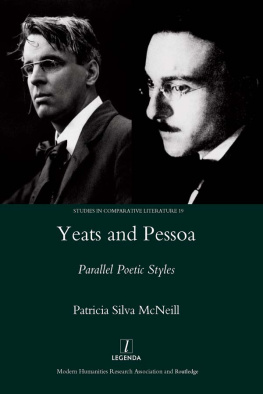


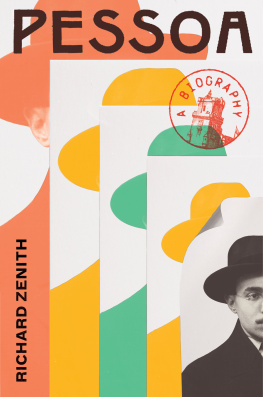
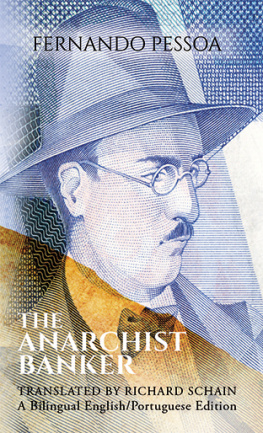
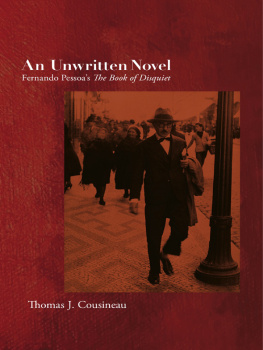
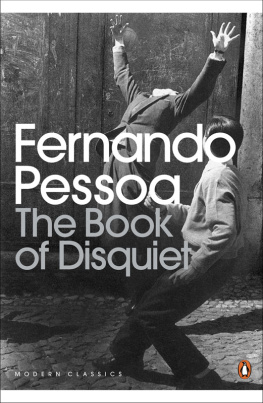
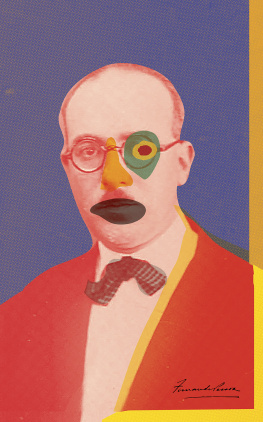
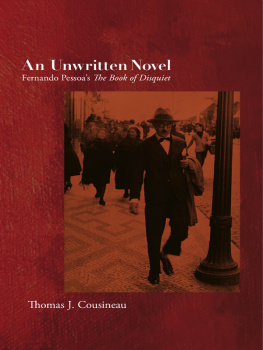
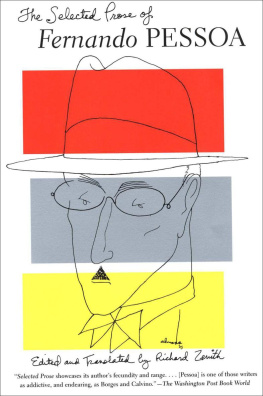

 Preface, English text, and translation copyright 2001 Erin Mour
Preface, English text, and translation copyright 2001 Erin Mour